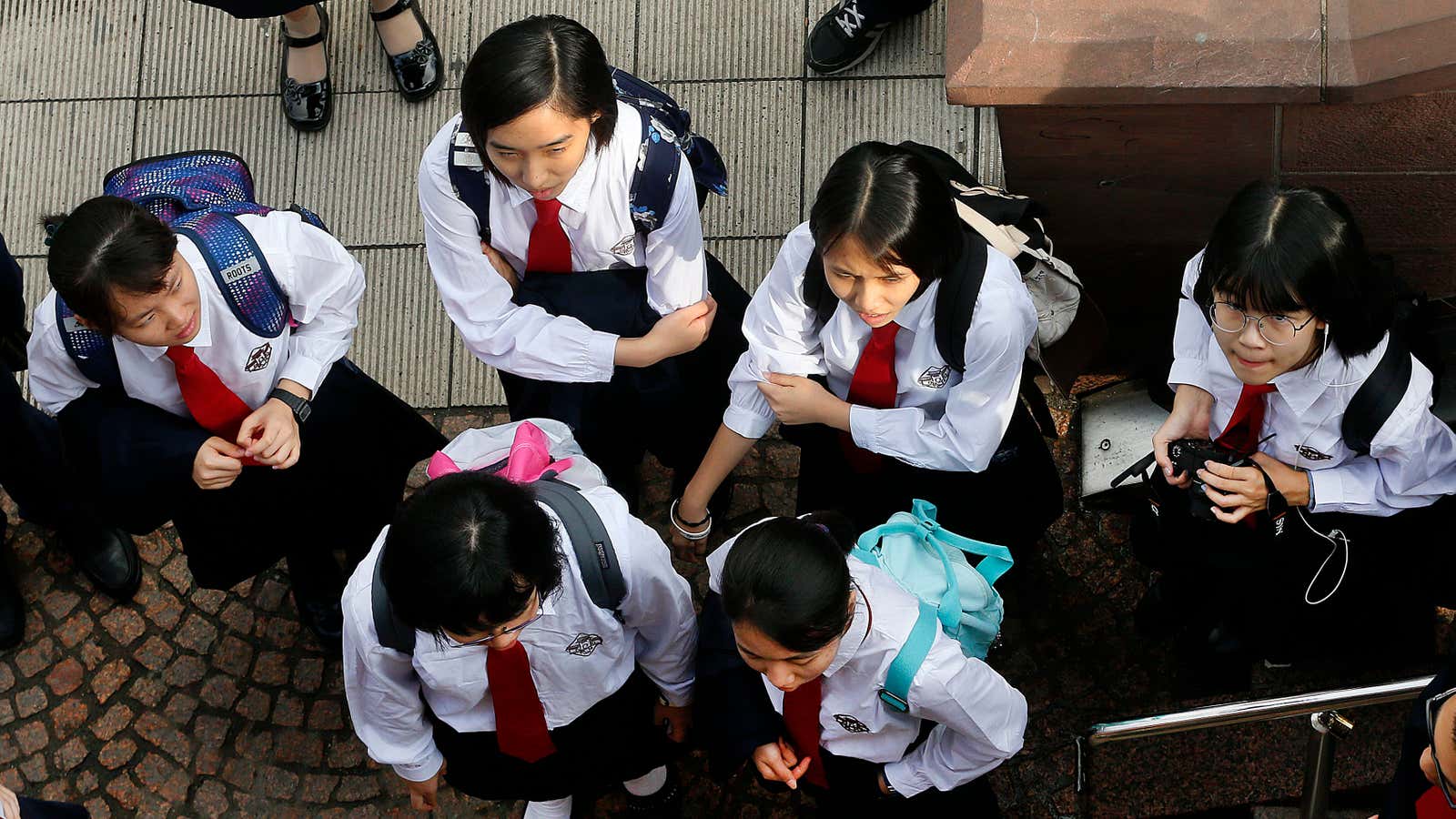An essay that has gone viral on WeChat, China’s most popular social network, is highlighting the anxieties of middle-class Chinese parents who feel they have no option but to pay huge sums of money for their children’s summer activities. Under pressure from society and other parents, many feel it’s the only way for their kids to keep up with their peers.
In the piece, “A Monthly Salary of 30,000 Yuan Is Not Enough for a Child’s Summer Vacation” (“月薪三万,还是撑不起孩子的一个暑假”), a mother said that in spite of her well-paid job earning nearly $4,500 a month—13 times the minimum monthly wage—as a senior executive in Guangzhou, she can hardly afford to pay for her daughter’s “summer vacation,” and hesitates to buy new clothes for herself.
The extravagant summer program includes a 10-day study tour through the US, a daytime nanny, piano lessons, swimming classes, and courses in English, math, and writing. In total, the mother spent at least 35,000 yuan ($5,240) on her child’s summer vacation, with the trip to America being the most expensive part of the activities.
“The most torturous is that if you spend this money, it makes you feel bad,” the mother wrote. “But if you don’t spend this money, it makes you feel bad for your child.”
During school holidays, China’s wealthy families often send their children abroad for schooling at prestigious institutions. Since middle-class parents struggle to compete with them, they fill their children’s vacation time with English classes and overseas summer camps. Those in lower classes have fewer resources to compete, but hope their children study hard over the summer to earn top marks at the gaokao, China’s national college entrance examination.
Shanghai, Beijing, and Guangzhou—China’s wealthiest and most populous cities—are where most of the overseas summer program participants are from. The popularity of these types of camps is growing, especially among middle- and high-school students, according to a survey conducted by China Daily.
Through overseas summer programs, parents hope that their children will practice their English, learn to be more independent, and experience “Western education”—and they are more than willing to pay for it. Although prices vary, these trips never come cheap. Most programs cost around 20,000 to 30,000 yuan ($3,000 to $4,500), and the most popular destinations are English-speaking countries, such as the US, Canada, Australia, and the UK.
For China’s middle-class urban parents, there’s increasing pressure from their peers to invest in their children’s education. “They compare [overseas study trips] like they compare luxury clothes or cars,” Xiong Bingqi, deputy director of the 21st Century Education Research Institute, told state-owned newspaper Global Times. “If a monthly salary of 30,000 yuan could not support a holiday, there must be irrational comparisons going on.”
After the essay went viral, several state-run Chinese media outlets, such as the People’s Daily (link in Chinese) and Beijing Youth Daily, wrote articles denouncing these overseas study trips, saying it was a way for parents to show off their wealth.
The Beijing Youth Daily wrote: “If a monthly salary of 30,000 yuan is not enough for a kid’s summer holiday, parents should do some self-reflection to ask themselves if this is reasonable.”
The People’s Daily appealed to parents to “lighten the burden on children” and to “diminish the tendency to compare among parents.”
The debate around expensive summer programs for children has unfolded on Weibo, China’s version of Twitter, with users divided into three main camps.
There are those who support the mother’s investment in her child’s education, as one commenter argued:
Only ridiculous people will object to this mother’s decisions. She merely wants to create better education opportunities for her daughter to expand her horizons and make her more knowledgeable. Is this called “showing off money” … ? Now that we have better conditions for our younger generations, there’s nothing wrong with using them to help [our children] become all-round individuals. Do you want them to be like you in the future, so poor and useless?
Some, however, are appalled at how parents overspend on education. “What do you want me to say if you earn 30,000 yuan per month but live the life of someone who makes 50,000 yuan?” asked one. They also condemn how the mother burdens her child with a busy schedule, ruining her holiday.
The other camp blames China’s education system for the proliferation of these extravagant summer study trips, while some also question China’s class division and unbalanced education resources:
No amount of money is [enough] when it comes to comparison and vanity. It is this comparison that makes children and parents feel inferior and unsatisfied. What if we cancel the system of gaokao and encourage a system that celebrates diversity?
Regardless of opinions, one thing is for sure, and it’s that there’s huge demand for such summer programs. Hoping to capitalize on the trend, new ones are popping up frequently, but some have been criticized for their low-quality accommodations, cheap food, and potential safety hazards.
This post originally appeared on What’s on Weibo.
